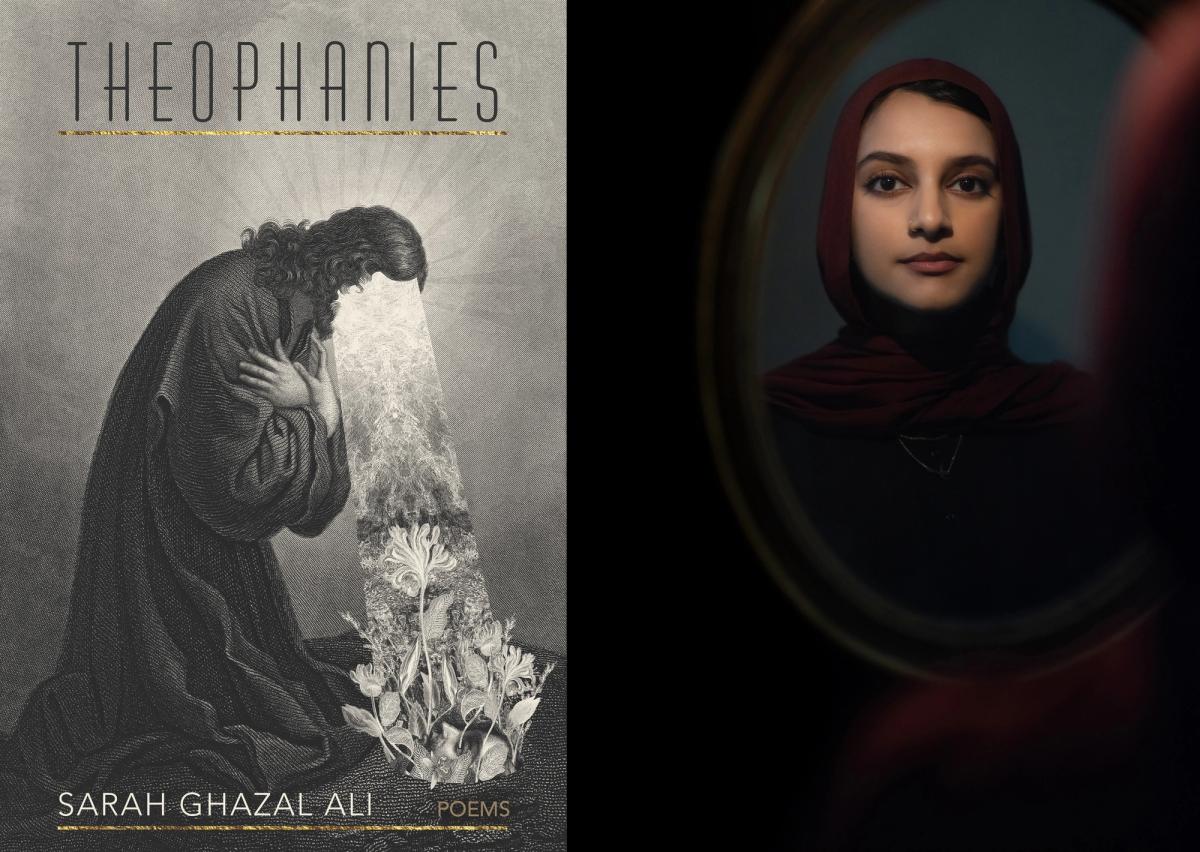
ZAGHROUTA!: Theophanies by Sarah Ghazal Ali
1. How did you come to writing? Who were the guides, teachers, guardian angels, or ancestors who brought you here?
I have loved to read since childhood, but really took to poetry in high school when I wrote a research paper on Sylvia Plath’s poem “Tulips.” It was the first time I really lived in the world of a single poem for an extended period of time. I loved the experience of finding and checking out every book about Plath from my town library, and trying to contextualize the poem within what I was able to learn of her life and work. It brought poetry alive and made it feel serious and important. In college, I was lucky to have an encouraging teacher early on, the brilliant poet and translator Whitney DeVos. She introduced me to the work of Natalie Diaz and Claudia Rankine, and made it feel possible to devote myself to a life in writing. I look to Faiz Ahmed Faiz, Parveen Shakir, Etel Adnan, Rainer Maria Rilke, and Mahmoud Darwish as ancestors and guides.
2. What do you write towards? What do you write against?
I write towards the untouchable and unknowable divine. I write against silence and erasure.
3. How did you find the title of this book? What kinds of negotiations were involved—with yourself, the work, or the publisher?
The moment I encountered the word theophanies for the first time I knew it would be the title. I don’t remember the moment of encounter, but I remember clearly the conviction that followed—it was completely natural, as though there had never been and could never be any other options. I never questioned it, and my publisher didn’t, either. When I’m stuck, I still sometimes write the title “Theophanies” at the top of a page and see what happens. I think I could write into that title for the rest of my life and not be done with it.
4. We would love to know a little about your process of writing Theophanies. How much planning vs discovery was involved? Did anything about the experience of writing or revising surprise you?
It was almost entirely discovery. I originally set out to write a very planned book about something else entirely, but every poem I wrote was stale and absent of risk or real emotion. I felt compelled at some point to write into my namesake, the matriarch Sarah, and when I finally gave myself permission to write a persona poem in her voice—the result of which is the poem “Annunciation”—it unlocked a new obsession. The most surprising part of revision once the book was accepted for publication was how painful the experience was, how much it hurt to reread and relive the hurt that led to the writing of certain poems. The things they grieved—patriarchal teachings, domestic violence, loneliness—didn’t stopped being relevant for me just because the book was done.
5. How do you want this work to be read? What do you most wish for from your reader?
I want it be read with generosity, an open mind, and a willingness to learn. I come to poetry to be challenged and to learn new words, concepts, and ways of seeing. I hope readers will take the time to explore new-to-them narratives about figures they might think are solely Biblical. I hope they’ll google what they don’t know rather than assume that their not knowing means this work isn’t for them. Please join me in my love of cross-narratives, and of the many valences of a story, dear readers!
6. One of the central tenets of RAWI's mission is promoting literary engagement with
SWANA writers. Are there any SWANA writers, past or present, who you feel have not received the readership or critical attention that they deserve?
As a South Asian, Muslim writer, I feel much kinship with my SWANA peers. Some contemporary SWANA poets I’ve encountered and been lucky to befriend / admire / learn from are Lubna Safi, Summer Farah, Hajjar Baban, Ladan Osman, Saba Keramati, and Sadia Hassan.
7. Since this series is called Zaghrouta, we want to know: how did you celebrate this book's birth? How would you like us to celebrate with you?
I celebrated with my nearest and dearest friends, with a book cake, and with a beautiful launch in a beloved bookstore. I celebrated with my daughter, an infant, and cherished seeing her little hands try to turn the book’s pages. I would love for you to celebrate with me by paying a visit to your favorite tree and telling it hello from me, or by requesting Theophanies at your local library!
———
Sarah Ghazal Ali is a poet, teacher, and editor. She is the author of Theophanies (Alice James Books, 2024), selected as the Editors' Choice for the 2022 Alice James Award. A Stadler Fellow and recipient of The Sewanee Review poetry prize, her work has appeared in The American Poetry Review, The Kenyon Review, the Academy of American Poets’ Poem-A-Day series, and other publications. She is the poetry editor for West Branch and lives in the Bay Area, California.
Photo credit : Beowulf Sheehan.